Why You Need Customer Reviews For SEO


Clients’ honest feedback can be underestimated in the world of high-quality content, complicated marketing strategies, and sales funnels. Yet, they can be an efficient addition to an existing strategy.
Let’s take a look at the numbers.
- Users usually read 10 online reviews before they can trust a local business.
- 77% read customers’ feedback when shopping in online stores.
- About 92% of customers trust the reviews and recommendations shared by people.
Working on high-quality, consistent reviews can improve your overall marketing efforts and lead to better sales.
This article investigates how this is possible and how brands can use the power of reviews to their advantage.
Does SEO care about customer reviews?
For Google, word-of-mouth marketing is a source of trustworthy information.
Companies actively encourage customer feedback, as high-star reviews attract the attention of search engines.
In fact, after the Google search algorithm leak in 2024, reviews and SEO can be linked together more tightly.
Think of Google as a customer: most users check the reviews before purchasing a product or visiting a place. Google considers the quality and quantity of reviews to evaluate the search position.
As Google reviews and Google Maps are connected, getting consistent and positive feedback makes a business more noticeable to search engines and increases its chances of getting into Google listings.
Google reviews are also great for local SEO, as they increase the chance of appearing in the Google Local Pack. This is a listing of local brands that offer a product or service the user is searching for.
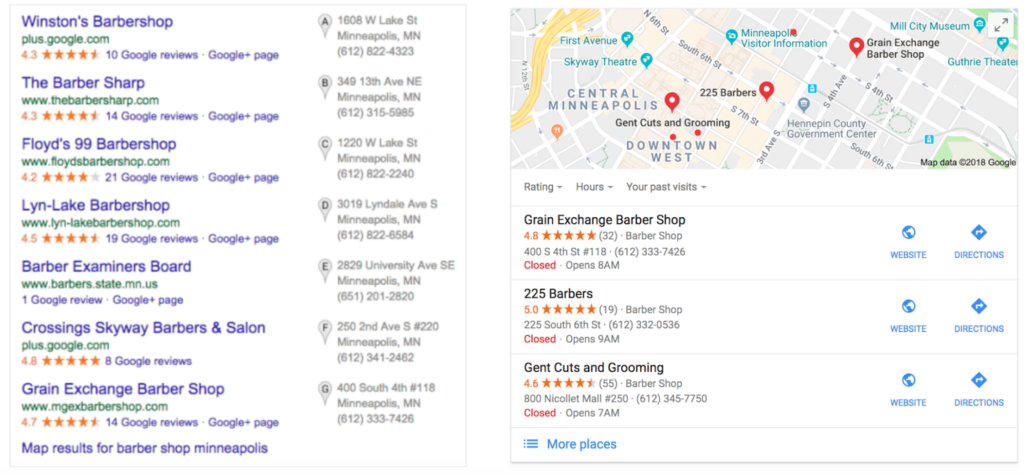
Being a part of such a listing as one of the first suggestions may drastically improve sales, especially for local business owners.
So how to get there?
High-quality reviews are one of the possible answers. According to a recent study, local product ratings are considered one of the most important factors influencing the pack.
Furthermore, there's now a "At a Glance Snippet"
What is the "At a Glance" snippet?
At a glance snippet is something Google produces automatically to showcase what a company is about.
If you right-click the three dots on the snippet, Google states that "This is content from searches for wello2.com to help you learn more about their background and see how other sites describe them".
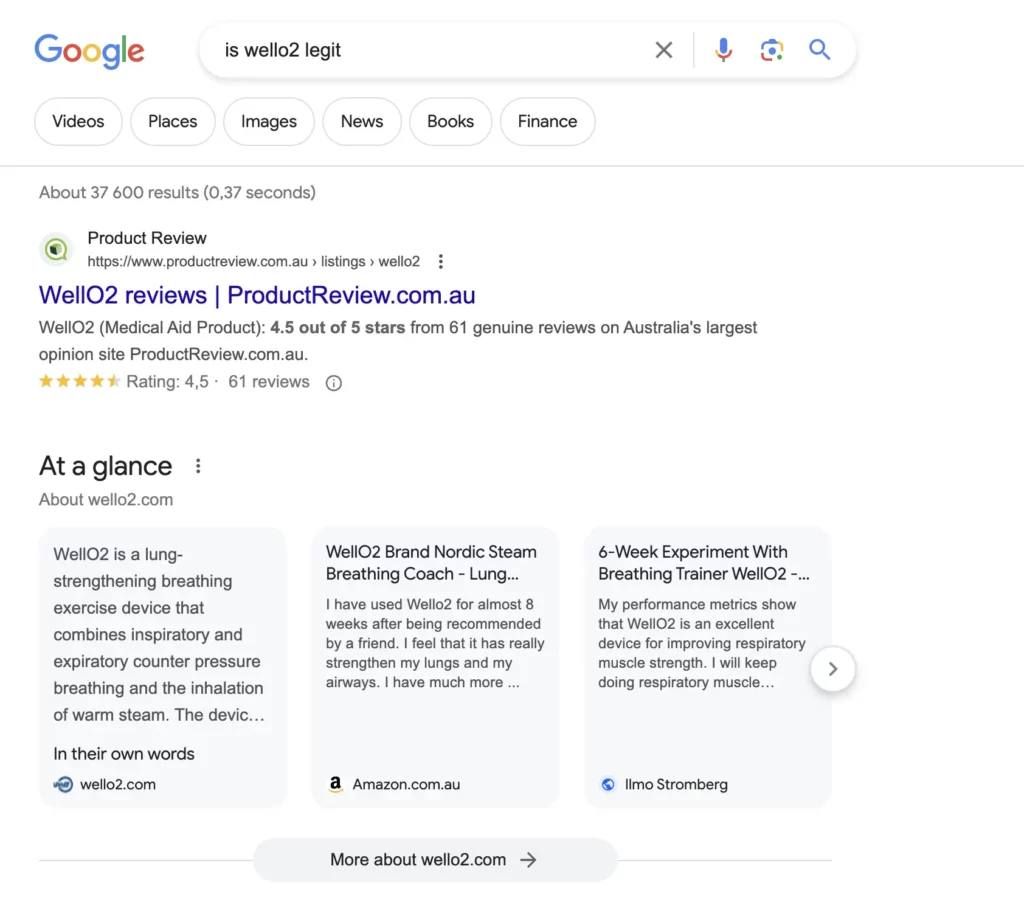
As you can see, there's the "in their own words" part, but all other results in this snippet are long-form reviews and product reviews posted on other domains.
Talk about social proof...
This snippet can potentially play a significant role in your brand's and site's reputation.
Six ways consumer reviews can improve SEO
1. Rating factor in Google SEO rankings
Reviews have an actual impact on SEO. Google trusts customers, which is why the information obtained from them has value for search engines.
When testimonials are available, customers find it easier to interact with the website and connect with the product.
Your rank may decrease if you do not feed search engines with constant reviews.
To maintain your rank, consider exploring Page Experience Report tips alongside gathering reviews.
2. Reviews can help target more keywords
Longtail keyword research is one way to make reviews a source of organic traffic.
Long tail keywords are keywords that include 3 or more words. Users usually prefer typing in a narrow, more accurate query.
For instance, a visitor looking for a place to eat is more likely to google ‘thai restaurant downtown’ instead of just ‘restaurants’.
Sure, the longtail keywords may bring less traffic, but specific keywords win when it comes to conversion rates. They set up communication between the potential customer and the business, helping them find each other.
Having reviews on the page will help to target more keywords increasing the chances of a perfect match. If your business provides a service or a product that the user is searching for, reviews will help to bring the user closer to the page.
That's why you should add Google reviews to your website.
3. Reviews can increase website traffic
There are several reasons why users’ feedback can drive more organic traffic and attract potential customers.
The first reason is the density of the webpage content. Reviews add more text, which is why your page can be considered by Google when users type in their queries. The search engine may consider the content customers write as reliable, accurate information and show it among the first searches, bringing you potential customers.
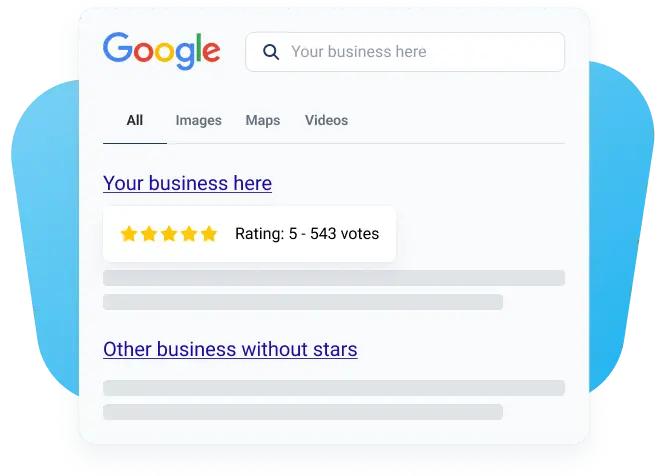
Second, reviews are a way to diversify your content on the webpage, which may decrease the bounce rate. If visitors find the overall page content valuable, Google will notice it, as search engine optimization aims to offer users the best possible experience.
This is why the biggest SEO companies on the market suggest incorporating user-generated content like reviews as part of your on-page strategy. When reviews provide real insights, address common concerns, and highlight specific product features, visitors are more likely to stay longer, engage more, and explore additional pages. All of these behaviors signal to Google that your site is providing relevant, high-quality content — which can contribute to improved rankings. Plus, varied content types help break up static product descriptions, making the page more dynamic and user-friendly.
4. Reviews can reduce the bounce rate
The bounce rate shows how many users drop out of the website without exploring it further.
The bounce rate does not directly affect SEO. However, it can have an indirect impact — if the bounce rate is high, it may indicate an issue related to the SEO ranking. For instance, examine how long the webpage takes to load, design and content quality, call-to-action, and whether the webpage is mobile-friendly.
Even though decreasing the bounce rate is a process that requires an analysis of the website and the users, the correct positioning of reviews can also help.
The reviews should be located at the top of the page. This way, interested customers do not need to scroll long to get the information they need. Thoroughly added rating elements with creative positioning will most likely decrease the bounce rate.
Pro tip: Add a review widget to your website, so website visitors need to click to see more reviews. This increases to time spent on page and get you those clicks!
It does not have to be a direct review from a customer — you can add stars, the general number of satisfied clients, and other metrics that can be helpful to users. You can even put a rating on every product or make a list of top products that can earn the user’s trust right away.
It's all about adding trust signals where your potential customers need to see them.
5. Reviews are a key indicator of quality for those who may be considering your services
Get in the head of the customer for a minute.
You’ve carefully led the customer through the sales funnel up to the purchase. Everything is set up, and they find the value of the product and need it. Yet, they have never tried the brand’s product before.
What would be their last step in the decision-making process? Yes, most likely, the reviews would be the last hit.
Let’s look at another example. You’re stuck deciding between two fairly good products. They are practically identical, with just a few differences. One product has over 20 honest feedback with pictures, and the other one has two poorly-written reviews. Even on a subconscious level, buying the first product seems safer.
It would be sad to spend all that effort on building great SEO and spend money on marketing campaigns without considering the risks at the final stage. Quality is nearly a synonym for a set of good reviews — you should consider this when prioritizing the page content.
6. Reviews increase social sharing
Considering people's nature, word-of-mouth marketing remains a powerful tool in promotion.
People trust recommendations from friends, colleagues, family, and even other people. Showing reviews on social media can increase the audience's trust in the product. Customer reviews can change the game, but there is a twist. Discover how they can boost your SEO efforts, drive organic traffic, and increase conversion rates.
How to Get More Reviews and Improve SEO Efforts?
Create a profile on a third-party review site
Google My Business, Yelp, and Facebook are popular third-party services for collecting reviews.
The more opportunities you give users and encourage them to share honest feedback, the quicker you’ll have enough reviews to help you with SEO.
To get more Google reviews, all you need to do is copy-paste the Google review link to your Trustmary survey.
The survey logic will take care of the rest.
Once you have the reviews on those sites, the next step is to add reviews to your website.
Add star review ratings to your product listings
Star review ratings will make it easier for visitors to analyze the overall quality of the product and see whether they should spend time reading what customers have to share and investigating the product further.
This means businesses always have to work on the quality of the product first. Yet, content-wise, adding ratings is great for SEO. These ratings can be for a certain product you provide or next to the client's testimonials.
Positive star reviews increase the chances of visitors clicking on your link and paying attention to your product, which will most likely increase your brand's conversion rate.
Besides, they can also be shown on rich snippets, which can improve click-through-rate (CTR).
If a star rating is included, it gives an advantage over web pages that do not have such snippets. Here, you can see the average rating of the hotel from a single google request.
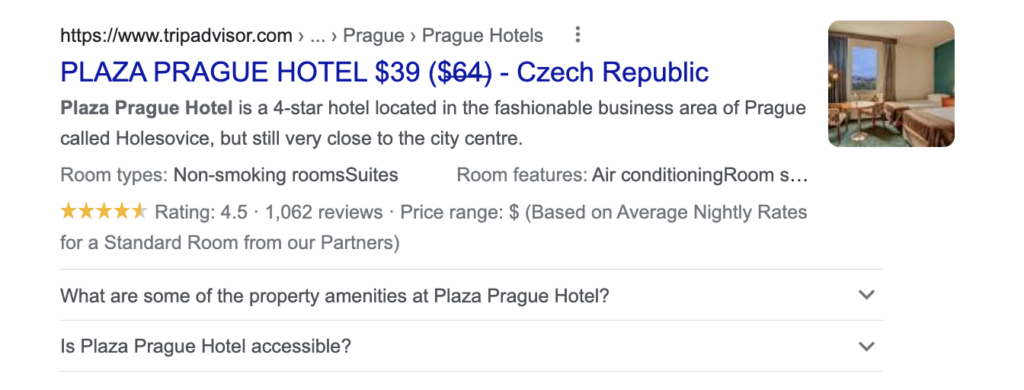
When you use Trustmary's review widget on your website, you can easily activate the rich snippets data and signal to Google that it should show your star rating on the SERP.
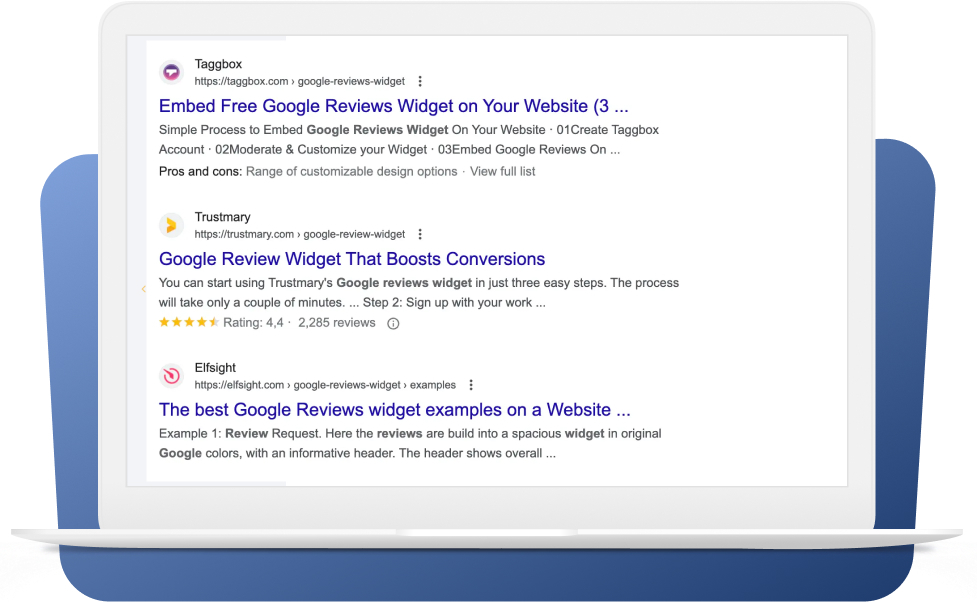
This is one of the easiest ways to boost your search engine rankings.
This easy SEO strategy pplies both to local businesses as well as to bigger brands, as you can see above.
Ask your customers for feedback at the right time
To get more reviews, companies should know when to ask for them.
The first rule: emotional feedback is the best one. The best idea is to ask for customers’ opinions when an impression is fresh — especially if the service was provided well or if a customer enjoyed the experience.
There's a big difference in the response rate and quality of the review, if a restaurant asks for a review right after the meal or after two weeks.
Besides, you can get a much better response rate if businesses ask customers to rate the product right after the purchase before forgetting what they bought and how they felt.
The second rule: if you are selling a service (like an app subscription), you should wait for the user to get familiar with the app and notice all the benefits. Ask to rate the app once customers have used the service quite a few times and give them the option to do it later.
Encourage customer reviews
Encouraging your customers to share honest feedback is always a good idea, but only when done properly. You should avoid review gating or fake engagement when incentivizing your customers to leave a review.
We actively collect reviews, valuing them as an authentic measure of success and a cornerstone in our business model.
Andrew Cussens, Owner @FilmFolk
Our systematic gathering of feedback has yielded invaluable data; specifically—our analytics team crunched the numbers—to reveal a staggering 35% increase in customer engagement on projects where clients were prompted to leave reviews.
Review gating is when only satisfied customers more likely to leave a good review are encouraged to share their opinion. Having all good reviews is not always a good thing — it contradicts the entire idea of honest feedback.
That is why businesses should ask everyone, despite their level of satisfaction, to rate the service or a product.
You'll see the fake engagement section if you open the Maps User Contributed Content Policy and go to the Google prohibited content page.
It includes paying for reviews, not posting negative ones, posting false information, and when the feedback is encouraged by a benefit or discount. Not following these directions can lead to an account's blocking and reputation loss.
Remember that users who take reviews seriously can always find out whether it is fake with the help of services such as Fakespot.com and reviewMeta.com.
These rules apply to review sites, but you can still choose which reviews you want to use on your business website.
Respond to Google reviews
Responding to every positive and negative review is an essential part of strengthening the brand image and improving its reputation. It creates a caring image and encourages new visitors to share their experiences, as they feel like they are being heard.
Perfection does not make a company good — transparency and the desire to solve conflicts do.

Display reviews on your website
Businesses need to ensure that users can find reviews directly on the site, not only through third-party platforms.
This way, users who bought the product from there can leave feedback. For instance, Airbnb displays reviews on the page with all the apartment information and actively encourages people to rate the apartment after the visit.
You can also use services with customizable widgets like Trustmary to display reviews that correspond to your site’s vision and goals.
With Trustmary, you can add reviews to any website, including WordPress, Squarespace, Shopify, and Wix.
Important takeaways
Here are the most valuable insights you can get while deciding on doing reviews a part of the SEO strategy:
- Reviews have proven to affect SEO positively: high-quality, consistent feedback drives organic traffic and increases conversion rates for the brand.
- Feedback should never be compromised. The company should ensure both positive and negative feedback is encouraged and posted, with no fake engagement.
- Reviews influence the site’s traffic and decrease bounce rate by helping search engines to offer the most relevant content.
- Encourage feedback on third-party platforms and your site to boost the number of reviews.
- Use star review ratings with rich snippets — it will increase the click-through rate, leading to improved conversion.
Our reviews enhanced our SEO rankings—witnessing a 50% surge in organic search traffic—and consequently amplified the visibility of both our studio and its services.
Andrew Cussens, Owner @FilmFolk
Besides the obvious reasons companies should continuously encourage customer reviews, they can also strengthen brand image.
However, it depends on how you approach them. You should not exclude any groups from the feedback process, nor should you encourage any fake review, be it positive or negative.
This way, the connection with your customers will become even stronger, and Google will know your website can be trusted.
It also helps to: collect honest feedback, make ratings visible to all users on the website, add star reviews to the product listings, and make sure you appear on third-party platforms.
The article was written in collaboration with SE Ranking.
FAQ
Do reviews help rank on Google?
It depends on a few aspects:
- Does your company have a GMB profile?
- Do you have reviews on other review sites?
- Have you added review schema to your website?
Having reviews has a serious impact on your overall credibility as a business. If you're able to convince people that you're a reliable company, it'll boost the time they spend on your website which has an impact on your organic rankings eventually.
How can I boost SEO with reviews?
The first step involves creating a process that helps you get new reviews constantly. The second step is to add reviews to the website, and the third step means adding a review schema markup so search engines can read the reviews.